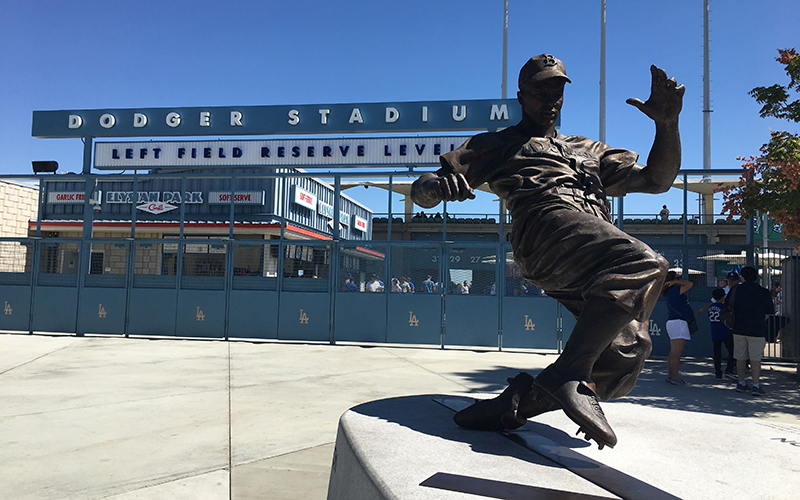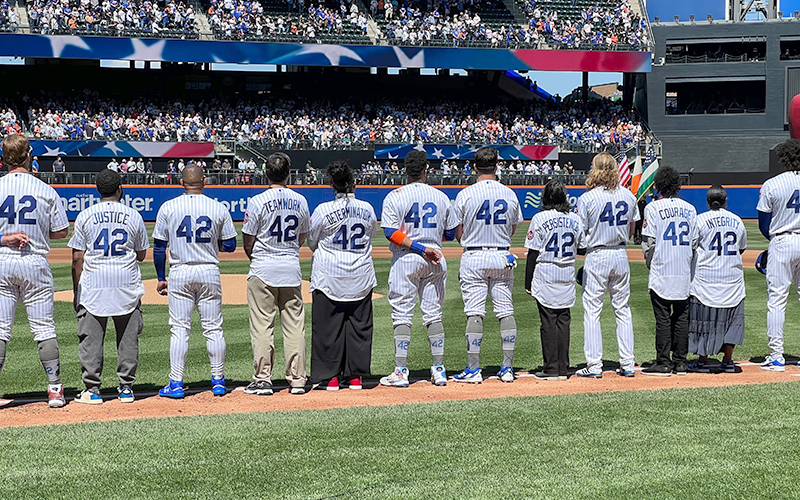
“A statue of Robinson, highlighting his iconic tendency to steal home plate, was unveiled at Dodger Stadium on April 15, 2017 for the 70th anniversary of his major league debut. (Photo by Joey Vacca/Cronkite News)
LOS ANGELES – This year marks the 75th anniversary of Jackie Robinson’s debut as the first Black player to enter the major leagues, and as has become tradition in Major League Baseball, every player will take the field April 15 wearing his No. 42. This year for the first time, every team will sport the retired number in Dodger blue.
While the nation celebrates one of baseball’s greatest players, historians and those who work at the Southern California athletic department where he got his start reflect on Robinson’s legacy outside of Ebbets Field.
Michael Long, Ph.D., is a historian and editor of the book “42 Today: Jackie Robinson and his Legacy,” who says there’s more to Robinson’s legacy than the countless accolades he earned as a player, including National League MVP in 1949. Long before Robinson played for UCLA or “cracked” baseball’s color barrier in 1947, he was a standout multi-sport athlete at Pasadena Junior College, now Pasadena City College, or PCC.
“When we look at his younger years, we see a kid in Pasadena who aggressively fought racial injustice in his hometown and who aggressively fought on every ball field and track field that he ever stepped foot on,” Long said. “In Major League Baseball his aggression had few peers.”
That aggression may have been born of a fight to get on the field in the first place. Today North American-born Black players make up 7.2% of Major League rosters. One of Robinson’s most vocal desires was to see more Black management in baseball, but that wasn’t realized until 1975 when Frank Robinson became the first Black manager in the league, assuming the coaching role in Cleveland. In 2022, two of the 30 MLB managers are Black.
As the first man to break the color barrier in baseball, Robinson’s name is enshrined in his old community college’s Sports Hall of Fame and the Lancers’ football and baseball stadiums. Those who currently walk the halls of Robinson’s hometown community college remember more than just game highlights.
“We’re talking about an icon of the 20th century,” said Robert Lewis, sports information director at PCC. “Not just for athletics but for so many different reasons.”
Between the 141 home runs and 200 stolen bases, Robinson was widely known for his athletic feats over his professional career. But for PCC athletic director Tony Barbone, how Robinson did it resonated more.
“Was stealing home the thing to be known for, or was it the courage to steal home?” PCC athletic director Tony Barbone asked. “If you take off all the uniforms and you take away all the cleats … he’s been iconic in all kinds of movements within our society.”
Long said Robinson faced his own struggles fighting back against police brutality as a young man in Brooklyn. After he retired from play, Robinson became more involved in the civil rights movement. He had many close exchanges with Dr. Martin Luther King Jr. and took part in the 1963 March on Washington.
“One thing that Jackie Robinson had was certainly an insurmountable amount of courage,” Kyle Mays, Ph.D. and assistant professor of African-American studies at UCLA, said. “It took a lot of courage … to adapt and try to make his community and other communities better and simply see Black people as human.”
As courageous as he was, Robinson himself viewed his athletic career as only a part of what he sought to do.
“I honestly believe that baseball did set the stage for many things that are happening today, and I’m proud to have played a part in it. But I’m not subservient to it,” Robinson said in a 1972 interview with the LA Times.
And while Robinson appreciated the opportunity baseball gave him, Long pointed out the revered player wasn’t entirely satisfied.
“He looked back on his career, his baseball career, with some regret when thinking about his own failure to speak out as publicly as he could for civil rights,” Long said. “He faulted himself on that point.”
But the message was loud enough to reverberate years later. Many athletes or public figures no longer shy away from voicing their opinions on societal issues. And it’s a long-standing trend – from Muhammad Ali’s outspoken protests of the Vietnam War to Colin Kaepernick kneeling for the national anthem – that Long connects to the foundation Robinson laid.
“I think that Robinson could not help but be pleased to see the way that many Black athletes have rallied for the Black Lives Matter movement,” Long said. “When I look at the courageous Black athletes who joined the Black Lives Matter movement and who continue to advocate for racial justice, I’m reminded that they stand on the broad shoulders of Jackie Robinson.”
As today’s society continues to build on that foundation, Mays feels that people of all backgrounds can also learn from Robinson’s struggles.
“We can learn from Jackie Robinson that we still must struggle in all forms to end various forms of racial oppression,” Mays said. “They can take away from him a certain level of humility.”
But Jackie Robinson wasn’t the only Robinson to be admired, Long said.
“Rachel Robinson often gets lost in the telling of Jackie Robinson’s story,” Long said of Robinson’s wife of 26 years. “But like her husband, she was a fierce advocate for racial justice on and off the baseball diamond.”
Following her husband’s death, Rachel Robinson started the Jackie Robinson Development Corporation to help build and manage low- and moderate-income housing. One year later Robinson started the Jackie Robinson Foundation, a nonprofit organization that provides college scholarships and leadership training for minority college students.
Whether it was fighting for equal rights or fighting to steal home plate, Long will always remember Jackie Robinson’s innate passion.
“This guy had an inner fire, an inner fury that went out only on Oct. 24, 1972, the day he died,” Long said.

